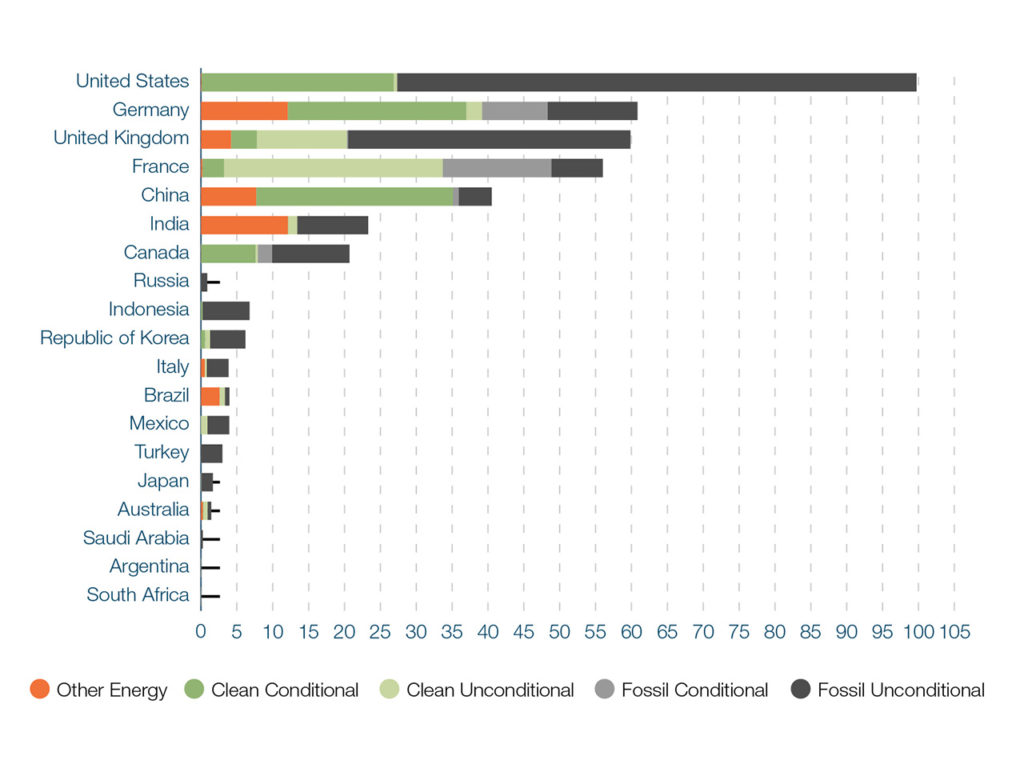A new report from technology company Wärtsilä reveals that UK and US stimulus packages announced for energy, as part of measures to rebuild from the impact of the COVID-19 pandemic, are heavily weighted to support legacy fossil fuel energy. This misses the opportunity to create new green jobs and accelerate the transition towards a flexible, renewable-powered economy. However, modelling suggests the UK could reach 60% renewable power system by 2025 if it takes the right path.

Wärtsilä’s report – Aligning Stimulus with Energy Transformation – highlights that $5 billion USD (£3.8 billion) stimulus commitments have been allocated to support fossil fuel energy compared to only $158 million (£121 million) for clean power generation. This level is not aligned with the UK’s ambitious targets to achieve 57% greenhouse gas reduction by 2030 compared with 1990 levels and net-zero by 2050.
Leveraging energy stimulus to reach 60% renewable power in the UK
The report models what could be achieved if UK energy stimulus was entirely dedicated to measures to cost-optimally increase renewable energy, aligning economic recovery with decarbonisation.
Wärtsilä’s analysis identifies that UK energy stimulus, leveraged to unlock private sector investment towards the energy transition, could enable the UK to reach a 60% renewable power system by 2025. This would cut power sector carbon emissions by 58% compared to current levels and put the UK on track to meet its net-zero emissions target by 2050.
A cost-optimal 60% renewable power system would consist of 60 GW existing and new renewable energy, supported by significant investment in energy storage and new flexible gas-based technologies, capable of operating on bio- and renewable synthetic fuels, including 7 GW of battery energy storage and 14 GW of flexible gas-based generation enabled for future carbon-neutral fuels.
This could result in over 120,000 jobs in the renewable energy sector alone – 175% more than focusing stimulus on rebuilding legacy energy systems.
“The UK is at a fork in the road”
Ville Rimali, growth and development director at Wärtsilä Energy said, “In the UK and across the G20 as a whole, the stimulus ‘scales’ are too weighted towards support for legacy fossil fuel-powered systems, despite the agenda for rapid decarbonisation that’s underway worldwide. Refocusing stimulus towards renewable and flexible energy would accelerate this shift, create jobs and cut emissions.
“The UK energy system is at a fork in the road. The current road could lock-in unnecessary fossil fuels, create 60% fewer jobs and miss the UK’s net-zero target. The alternative road leverages economic stimulus to unlock massive private sector investment, clearly putting the UK on a net-zero trajectory – potentially achieving a 60% share of renewables by 2025 and cutting emissions intensity by 58%.
“The UK has enormous potential to accelerate to net-zero and present a blueprint for other countries to follow, stimulating investment, jobs, technology intellectual power and economic growth.”
Creating half a million green jobs in the US alone
Wärtsilä’s report also modelled scenarios where the United States focuses its current stimulus package for energy on measures that cost-optimally increase renewable energy. The current stimulus pledged to support legacy fossil fuel sectors is $72 billion USD, which could result in over 100GW of new renewable energy capacity and over 500,000 new jobs – 175% more new than if stimulus was focused on legacy, inflexible fossil fuel energy.
Decarbonising the G20
G20 governments have so far committed at least $145 billion USD towards supporting clean energy, as part of economic stimulus measures to recover from the impact of the pandemic. However, this is a third less than the $216 billion USD total that has been committed to supporting fossil fuel energy. This represents a significant missed opportunity to accelerate the pace of the transition to clean energy worldwide.
As well as modelling the potential impact of stimulus on the UK and US energy systems, the report provides viewpoints from Wärtsilä experts in a range of other G20 countries, including Brazil, Australia and Germany. Experts agreed that, regardless of the starting energy mix, a combination of installed capacity, such as renewable energy, storage, flexible gas, and investment into renewable power to gas production, would consistently drive the most value in terms of lowering emissions and cost, and thus total benefit to society.
The report is available to download from www.wartsila.com/energy.




I find it incredible that this move should arise when there is an opportunity to create jobs, skills and an economy that is more sustainable than the present model. This decision as announced is a backwards step. All the talk about electric cars is unfounded if the electrical power is substantially derived from fossil fuels, in fact the losses through generation and distribution make it a nonsense. The UK should be in a position to lead the world in moving towards clean energy sources and an example of this could be in tidal power where there is a massive potential around the UK shoreline and has been proven so far with private investment in places such as Orkney and Northern Ireland. Support of this and other technology would lead to development and competitive generation costs.
One may only hope that some bright spark recognises the mendacity purveyed with well spaced facts. After all, we have seen before, many snake-oil salesmen creep from beneath windmills and toxic ev panels!